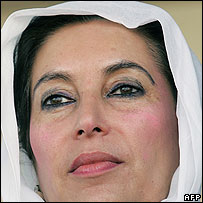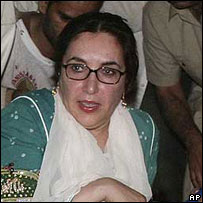Benazir Bhutto, twice prime minister of Pakistan, was assassinated on 27 December, 2007, while campaigning for parliamentary and provincial elections.
How did it happen?
Ms Bhutto was attacked as she was leaving a rally of her Pakistan People's Party (PPP) supporters in the garrison town of Rawalpindi.

Ms Bhutto was a deeply controversial politician
|
She was standing upright in the her armoured vehicle, with her head exposed above the open roof escape hatch, waving to the crowd when an attacker opened fire.
Seconds later, a bomb was set off at the scene which left some 20 other people dead.
The exact cause of Ms Bhutto's death is disputed. A report by the UK's Scotland Yard says she was killed as a result of the explosion.
Ms Bhutto's party has insisted it was the gunshots that killed her. They say they saw bullet wounds on her head while preparing her body for burial.
The British police report released on 8 February said the impact of the explosion forced Ms Bhutto's head to collide violently against the side of the escape hatch.
The report also said the attack was the work of one person, who first fired at Ms Bhutto's vehicle and then set off a suicide bomb.
Video footage of the attack aired on TV had led to speculation that Ms Bhutto had been targeted by two people, working in a team.
The British police said its work had been complicated by failures to conduct an autopsy on Ms Bhutto's body and preserve evidence from the crime scene.
However, the team said, "the evidence that is available is sufficient for reliable conclusions to be drawn".
The British police investigated the assassination of Ms Bhutto at the request of Pakistan's government.
Their report appears to support the government's view, announced days after the attack on Ms Bhutto, that she died as a result of head injuries rather than gunshot wounds.
At the time, the PPP described the government's verdict as "dangerous nonsense".
What was the impact of Ms Bhutto's death?
Ms Bhutto was the dominant figure among Pakistan's various secular and religious political parties.
She had twice served as prime minister and was hoping that the PPP would emerge as a major player in forthcoming elections, the first to be held since President Musharraf resigned as head of the army and became a civilian leader.

Ms Bhutto was unhurt after an attempt on her life in October
|
Western-educated and charismatic, she presented herself as a moderate, democratic force.
She was widely courted in the West, where it was hoped she could restore popular legitimacy to President Musharraf's faltering campaign against Islamist militants.
For the time being, her death has left a political vacuum.
However, the wave of popular sympathy triggered by her assassination could strengthen the PPP's showing in the 18 February elections.
Her only son, 19-year-old Bilawal, has been named as the PPP's new president, but is expected to remain a figurehead while he finishes his education.
In the meantime, the party is being led by Ms Bhutto's husband, Asif Ali Zardari, and PPP stalwart Makhdoom Amin Fahim.
Ms Bhutto and Mr Musharraf had been working on a power-sharing agreement.
The talks failed, leaving Ms Bhutto as a major rival to President Musharraf, rather than an ally.
Who could have targeted her in this way?
The government has blamed the attack on Baitullah Mehsud, a pro-Taleban tribal leader in South Waziristan region, abutting the Afghan border.
The CIA supports this view.
But a spokesman for Mr Mehsud has denied any involvement, calling the accusation "government propaganda".
Nevertheless, pro-Taleban and al-Qaeda militants who have taken control of Pakistan's tribal areas along the Afghan border have been linked by many analysts to the attack.
They made no secret of their determination to kill Ms Bhutto after her return to the country in October following years of self-imposed exile.
However, elements within Ms Bhutto's party believe her killing could not have taken place without the collusion of senior figures in the military and political establishment.
They have cited a letter Ms Bhutto released before her death in which she said she would hold President Musharraf's government responsible for any attempt on her life.
How did President Musharraf react?
Mr Musharraf appealed for calm immediately after the assassination, as disturbances broke out in various parts of the country.
He also postponed the parliamentary elections that were due to have been held on 8 January.

President Musharraf has spent his working life in the military
|
Mr Musharraf's popularity took a hammering during 2007, partly because of an intermittent military campaign against Islamist militants that alienated many but has yet to achieve clear results.
Only weeks before Ms Bhutto's assassination, he ended a six-week period of emergency rule, during which he sidelined leading judges who were set to rule on whether he was entitled to stay on as president.
He recently stepped down as army chief and appointed a colleague, Gen Ashfaq Kayani, to carry on the fight against the militants.
Mr Musharraf hopes parties loyal to him will fare well at the polls, thereby shoring up his credentials as a civilian president.
What is at stake for the region and the rest of the world?
The future of Pakistan is one of the keys to global security. Pro-Taleban militants and their al-Qaeda allies have become a state within a state in recent years.
Militants fighting Western forces in Afghanistan and the government there of Hamid Karzai have been able to operate from within Pakistan.
Many major terror attacks on the West - including the 11 September 2001 attacks in the US and the 7 July 2005 attacks on London - have been traced to militants in Pakistan.
Pakistan's military also has several nuclear weapons and there are fears these could pass into the hands of Islamist sympathisers if President Musharraf's grip is weakened further.
Pakistan's nuclear rival to the east, India, is watching the developments with concern.


~RS~q~RS~~RS~z~RS~58~RS~)
Bookmark with:
What are these?